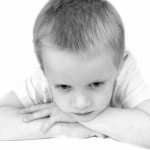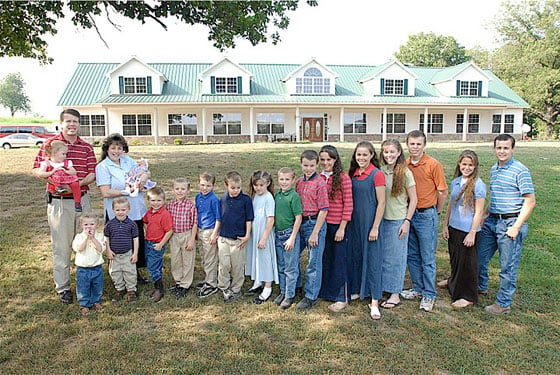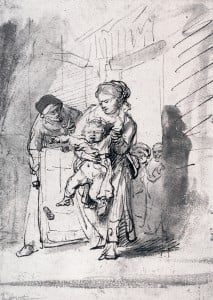I had a commenter on this post that asked about what the Catholic church teaches about discipline and what they have to say about spanking.
Here is the section of the catechism that directly addresses raising and disciplining children:
The duties of parents
2222 Parents must regard their children as children of God and respect them as human persons. Showing themselves obedient to the will of the Father in heaven, they educate their children to fulfill God’s law.
2223 Parents have the first responsibility for the education of their children. They bear witness to this responsibility first by creating a home where tenderness, forgiveness, respect, fidelity, and disinterested service are the rule. The home is well suited for education in the virtues. This requires an apprenticeship in self-denial, sound judgment, and self-mastery – the preconditions of all true freedom. Parents should teach their children to subordinate the “material and instinctual dimensions to interior and spiritual ones.” Parents have a grave responsibility to give good example to their children. By knowing how to acknowledge their own failings to their children, parents will be better able to guide and correct them:
“He who loves his son will not spare the rod. . . . He who disciplines his son will profit by him.”
“Fathers, do not provoke your children to anger, but bring them up in the discipline and instruction of the Lord.”
As I replied there, the Catholic church doesn’t seem to have any specific rules on how to discipline you children. And I know there are Catholic families that spank and that it used to be allowed in schools. However, I do think that the view of sin can change the way that you think about discipline, and I think that my delving into Catholic theology helped to re-shape the way I look at child-training.
Protestants and Catholics have different understandings of Original sin. Calvinists teach Total Depravity (from the synod of dordt) which means that humans are born in sin so great that they are incapable of doing good. Reason is clouded, so much so that the man has no free will and is in bondage to sin, which means that without the intervention of God (much like lighting zapping you) you will be unable to seek for God, or have any desire to serve Him. Original sin taught in this way, is almost “original damnation”.
And just in case you think that only the Calvinists have such an extreme view of the evil of humanity, you can see it in Luther’s writings on Original sin. While most Protestants would not formally endorse “Total Depravity”, through Luther, this intense view of original sin is a common thread throughout the Protestant tradition.
“It is also taught among us that since the fall of Adam all men who are born according to the course of nature are conceived and born in sin. That is, all men are full of evil lust and inclinations from their mothers’ wombs and are unable by nature to have true fear of God and true faith in God”
Augsburg Confession
That original sin (in human nature) is not only this entire absence of all good in spiritual, divine things, but that, instead of the lost image of God in man, it is at the same time also a deep, wicked, horrible, fathomless, inscrutable, and unspeakable corruption of the entire nature and all its powers, especially of the highest, principal powers of the soul in the understanding, heart, and will, so that now, since the Fall, man inherits an inborn wicked disposition and inward impurity of heart, evil lust and propensity; that we all by disposition and nature inherit from Adam such a heart, feeling, and thought as are, according to their highest powers and the light of reason, naturally inclined and disposed directly contrary to God and His chief commandments, yea, that they are enmity against God, especially as regards divine and spiritual things. For in other respects, as regards natural, external things which are subject to reason, man still has to a certain degree understanding, power, and ability, although very much weakened, all of which, however, has been so infected and contaminated by original sin that before God it is of no use.
Concord Catechism
How does your understanding of Original sin effect your view of the behavior of children? If you believe that humanity essentially has no desire or ability to seek after God, that those desires and behaviors are only available after God changes you (and regeneration is not connected to baptism) then it is easy to see your children as bad versions of yourself. Of course the sin “bound up in the heart of a child” will distort everything they do. Your children are out to sin and manipulate you as much as possible from birth. If you believe that your child is incapable of any good, and is only inclined to sin and perversion, how are you going to understand your child’s behavior? If you start to think that your baby is crying because they are selfish, and your toddler is messy because they have no self-control, then it’s easy to resonate with authors like Michael Pearl.
“To the child, a righteous parent is a surrogate god, representing the rule of law and the bar of justice. When the child is yet too young to fathom God, he is nonetheless able to relate to his parents in the same manner that he will later relate to God. The properly administered rod is restorative as nothing else can be. It is indispensable to the removal of guilt in your child. His very conscience (nature) demands punishment, and the rod supplies the needs of his soul, releasing him from his guilt and self-condemnation. It is the ultimate enforcer, preserving the child in authority and discipline until he is old enough to submit himself to The Eternal God.”
(You can read the rest of this here)
What is the child being punished for? “His very nature”. This may sound crazy to you. But when your entire understanding of humanity and sin has been shaped in this way it makes perfect sense. Good or even desire for good is impossible until regeneration by the Holy Spirit, and that is not possible until the child reaches the “age of reason”.
When I read the Catholic Catechism, I didn’t really notice anything different at first. But slowly it began to change the way I thought about my children.
405 Although it is proper to each individual, original sin does not have the character of a personal fault in any of Adam’s descendants. It is a deprivation of original holiness and justice, but human nature has not been totally corrupted: it is wounded in the natural powers proper to it, subject to ignorance, suffering and the dominion of death, and inclined to sin – an inclination to evil that is called concupiscence”. Baptism, by imparting the life of Christ’s grace, erases original sin and turns a man back towards God, but the consequences for nature, weakened and inclined to evil, persist in man and summon him to spiritual battle.
1704 The human person participates in the light and power of the divine Spirit. By his reason, he is capable of understanding the order of things established by the Creator. By free will, he is capable of directing himself toward his true good. He finds his perfection “in seeking and loving what is true and good.”
Here sin has changed the world and humanity, but human nature has not been totally corrupted. Man has free will, and is capable of seeking after God. God created humans good, and while we are flawed and crippled by sin, we still have the desire to do good, and the desire to seek after God.
The Catholic Parent should be seeking to discipline their children to cultivate the virtues, not punish them for the evil nature they already possess. For the Catholic, Original sin is about a lack of relationship with God which is changed by baptism. Humans have free will and because they live in a fallen world, they will choose sin, but they are equally capable of choosing good. For the Protestant, Original sin is a flaw to the core of the human being which cannot be corrected by baptism or anything else save the resurrection. You may still be saved by faith, but original sin (or your deeply flawed nature) is never truly resolved.
My perception of sin changed the way I disciplined my children.















